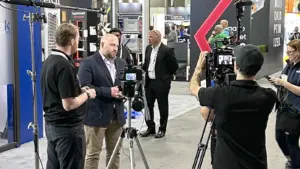The Infrastructure of Things (IoT) and its Implications for Retail
The tech industry has been enthusiastically promoting the Internet of Things (IoT) for the past decade. And while a bunch of smart devices and sensors scattered throughout an operation sounds great in theory, connecting those devices in a robust and reliable way presents a real challenge. In many cases, when one device fails it can cause the entire system to go down. So retailers need to look at not only the Internet of Things, but the Infrastructure of Things™ as well.
.jpg?t=1523542041381&width=300&height=300&name=shutterstock_513856630%20(1).jpg)
Network Infrastructure
In the same way the body relies on an interconnecting web of neurons to communicate, different types of wired and wireless data networks are used throughout a retail operation to connect devices. And just as sensory neurons and motor neurons receive different types of signals, different types of things require different data throughputs.
There are advantages and disadvantages to each type of network infrastructure. While a wired infrastructure may offer a lower cost, running wires throughout a business can be costly and difficult to upgrade and maintain. A wireless network, on the other hand, eliminates all the unsightly cables and delivers greater flexibility, but must incorporate the latest technology to ensure secure, reliable connectivity.
Creating a Better Network
It’s clear that demands for connecting smart devices throughout a location require a new level of thinking and designing. That’s why creating a better Infrastructure of Things™ is changing the game for retailers. Most networks in place today simply weren’t designed to provide wireless infrastructure in a connected world with high quality media, increasing demands on bandwidth, and universal internet. To address these needs, it isn’t enough to build intelligent protocols and applications—the actual architecture of networks must change.
In addition, until now, networks weren’t designed for secure data transmission; they were created to deliver voice, radio, and television. That means they offer open access, aren’t secure, and are easily hacked. The industry has been attempting to plug the holes for years, but most of these piecemeal solutions have slowed down data transmission to a crawl.
The AvaLAN Solution
In the past, most devices on the network were there for data collection, implying a one-way data stream from the device to the network. But smart devices involve data interaction, meaning devices must have the capabilitito actively communicate with each other across the network. And this kind of data interaction should be easy for businesses to perform – even by the layperson.
The AvaLAN solution is built specifically for wireless networks and uses proprietary protocols. Encryption technology ensures that customer data remains protected. Our solution even offers packet optimization for better integration with legacy networks. The result? Machine-to-network and machine-to-machine devices that create a “smart” retail space that is also secure.
AvaLAN Wireless is an industry leading developer and manufacturer of long range industrial wireless radios and cryptographic technology. AvaLAN’s products are designed to enable affordable secure wireless connections in perimeter or remote locations. Specializing in Cellular and the unlicensed 900 MHz, 2.4 GHz and 5 GHz radio bands, AvaLAN continues to innovate with solutions for commercial and retail fueling stations, digital signage, retail point-of-sale, and other industrial automation applications. While wireless technology innovation and manufacturing is at AvaLAN’s core, we continue to focus on solving our customer’s problems through complete solutions. In fact, Inc Magazine recently included AvaLAN Wireless in its 35th annual pick of 5000 of the nation’s fastest-growing private companies.
Read more at avalan.com








